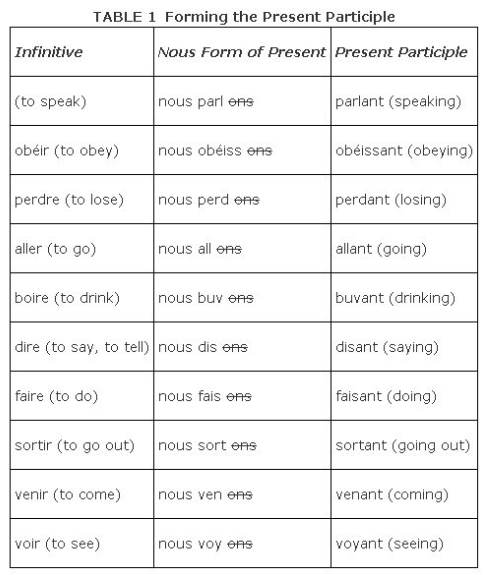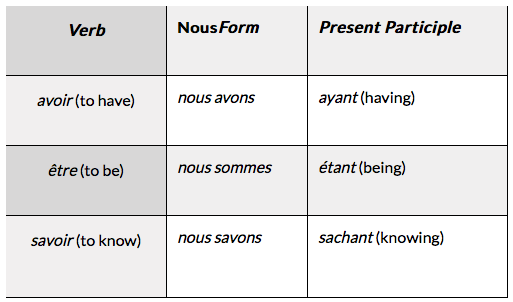Present Participles
|
The French gerund is used with the preposition en. It is equivalent to the English while + -ing, as in while eating (en mangeant); upon + -ing, as in upon arriving (en arrivant); and by + -ing, as in by exercising (en faisant de la gym).
The present participle is made by taking the first-person plural conjugation (nous) of a verb in the present tense, removing the -ONS ending, and replacing it with –ANT. marcher → nous marchons → march– → marchant This is crucial with irregular verbs, such as faire, voir, venir, etc. faire → nous faisons → fais- → faisant voir → nous voyons → voy- → voyant 3 verbs have completely irregular stems: être → ét- → étant savoir → sach- → sachant avoir > ay- > ayant The placement of a gerund in a sentence doesn’t really matter. It can be at the beginning or at the end, and people tend to put it at the end. En mangeant une pomme j’ai mordu ma lèvre. (While eating an apple, I bit my lip.) J’ai mordu ma lèvre en mangeant une pomme. (I bit my lip while eating an apple.) Reflexive verbs: en me promenant en te promenant en se promenant en nous promenant en vous promenant Uses of the gerund : • To express simultaneous actions. For example: ◦ Elle conduit en écoutant la radio. (She drives while listening to the radio.) • To answer the question “how/why.”. For example: Ayant trop bu, je ne pouvais pas conduire (Because I had drunk too much, I couldn't drive) Il gagne beaucoup d'argent en vendant de la drogue. (He earns a lot of money by selling drugs) Tu peux maigrir en marchant à l’école (You can lose weight by walking to school) • To say when something happens/happened. For example: ◦ Ils fument en sortant des cours. (They smoke upon leaving lessons) Elle a pleuré en apprenant la nouvelle. (She cried upon hearing the news.) |
In French, the present participle of a verb (the ‐ing form) may be used with the preposition en (while, on, upon, by, in, when) to form a gerund (a noun that, in English, ends in ‐ing). When used without en, the present participle may act as an adjective and is also used to express the ‐ingform of the verb in English.The present participle of all French verbs ends in ‐ant, the English equivalent of ‐ing.
Forming the Present ParticipleThe present participle of most French verbs (regular and irregular) is formed by dropping the ‐ons ending from the nous form of the present tense and simply adding ‐ant, as shown in Table 1. The line through the ‐ons part of the nous form indicates that it is removed to form the present participle.
Forming the Present ParticipleThe present participle of most French verbs (regular and irregular) is formed by dropping the ‐ons ending from the nous form of the present tense and simply adding ‐ant, as shown in Table 1. The line through the ‐ons part of the nous form indicates that it is removed to form the present participle.
English uses many more gerunds than French; therefore, the present participle is used much less in French and is often replaced with an infinitive:
The present participle is primarily used:
With the preposition en to imply simultaneous actions:
En + present participle may mean “by.”
Without the preposition en to show a cause, a reason, a motive, a condition, a result, an incidental circumstance, or an action that took place at the same moment as or immediately before the action of the main verb. When used as a verb, the present participle is invariable—meaning that there is no agreement of the present participle with the subject:
In addition, the present participle can be used as follows:
Some present participles may be used as adjectives and must, therefore, agree in number and gender with the nouns or pronouns they modify. They generally follow the noun or pronoun:
The present participle can, but rarely does, replace a relative clause ( qui + verb):
The present participle CANNOT be used:
To express “to be” + present participle (the English progressive form). To express that an action is in progress, use the present tense or être en train de + infinitive:
- J'adore le cyclisme. (I love cycling.)
- Danser me plaît beaucoup. (Dancing gives me great pleasure.)
The present participle is primarily used:
With the preposition en to imply simultaneous actions:
- Il parle en mangeant. (He speaks while eating.)
- Elle est arrivée en courant. (She arrived running.)
- Il est tombé en dansant. (He fell [while, when, upon, on, as he was] dancing.)
En + present participle may mean “by.”
- Il gagne beaucoup en travaillant. (He earns a lot by working.)
Without the preposition en to show a cause, a reason, a motive, a condition, a result, an incidental circumstance, or an action that took place at the same moment as or immediately before the action of the main verb. When used as a verb, the present participle is invariable—meaning that there is no agreement of the present participle with the subject:
- Étant occupé, je l'ai ignoré. (Being busy, I ignored him.)
- Elle est partie, oubliant ses clefs. (She left, forgetting her keys.)
- Regardant la télé, je me suis endormi. (Watching TV, I fell asleep.)
- Il étudie en écoutant la radio. (He studies while listening to the radio.)
- Il est entré criant. (He arrived screaming.)
In addition, the present participle can be used as follows:
Some present participles may be used as adjectives and must, therefore, agree in number and gender with the nouns or pronouns they modify. They generally follow the noun or pronoun:
- Je trouve ces filles charmantes. (I find those girls charming.)
- Ce sont des films amusants. (They are amusing films.)
The present participle can, but rarely does, replace a relative clause ( qui + verb):
- Je vois des gens qui portent des sacs. (I see some people who are carrying bags.)
- Je vois des gens portant des sacs. (I see some people carrying bags.)
The present participle CANNOT be used:
To express “to be” + present participle (the English progressive form). To express that an action is in progress, use the present tense or être en train de + infinitive:
- Il dort. (He is sleeping.)
- Il est en train de dormir. (He is sleeping.)
- Je préfère la natation. (I prefer swimming.)
- La pâtisserie est un art. (Pastry making is an art.)
- Je le ferai sans qu'il le sache. (I'll do it without his knowing it.)


